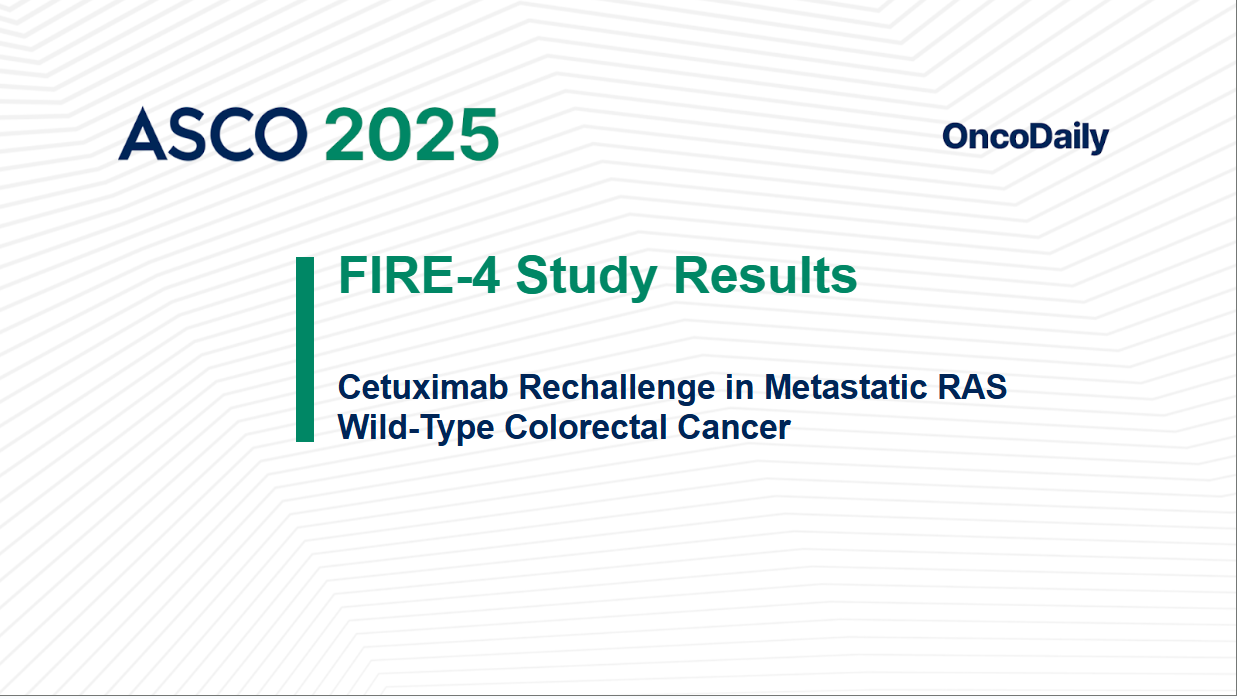
FIRE-4 Study Results: Cetuximab Re-challenge in Metastatic RAS Wild-Type Colorectal Cancer
The ASCO Annual Meeting 2025, set for May 30 to June 3 in Chicago, Illinois, at McCormick Place, is the global oncology community’s leading event. Thousands of oncologists, researchers, and industry experts will converge to present groundbreaking research, explore new cancer treatments, and shape the future of cancer care. Attendees can expect presentations on pivotal clinical trial results, discussions on innovative research, and critical insights aimed at advancing patient care and equity in oncology.
What Is the FIRE-4 Trial?
The FIRE-4 (AIO KRK-0114) trial is a randomized, phase 3 study that prospectively investigated the efficacy of cetuximab re-challenge in patients with metastatic RAS wild-type (RAS WT) colorectal cancer (mCRC). The study aimed to determine if re-introducing cetuximab, an anti-EGFR therapy, after an initial response to FOLFIRI plus cetuximab in the first-line setting, could improve patient outcomes. This trial was designed to build upon observations from smaller studies that had suggested a potential benefit from anti-EGFR re-challenge in later treatment lines.
Trial Endpoints and Translational Aims
The primary endpoint of the FIRE-4 study was overall survival (OS) after the second randomization. Secondary endpoints included progression-free survival (PFS) and objective response rate (ORR).
The overarching goal was to validate a therapeutic strategy (anti-EGFR re-challenge) that leverages the inherent biology of RAS WT tumors. The “window therapy” approach, designed to allow time for potential re-sensitization to anti-EGFR therapy, represents a translational concept. The study aimed to determine if this clinical strategy could translate into a meaningful survival benefit for patients who had previously responded to cetuximab-based therapy.
Read More ASCO 2025 Updates on OncoDaily’s Website
FIRE-4 Trial Results
The FIRE-4 study did not meet its primary endpoint of improved overall survival with cetuximab re-challenge. From August 2015 to February 2021, 672 patients were initially randomized, with 657 receiving treatment across 120 German and 10 Austrian centers. In the second randomization, 87 RAS WT patients who had responded to cetuximab-based induction therapy were randomized. 42 patients were assigned to physician’s choice of treatment, and 45 to FOLFIRI plus cetuximab re-challenge. Baseline characteristics were comparable between these groups.
Efficacy Outcomes
- Overall Survival (OS): No statistically significant difference in OS was observed between the re-challenge arm and the physician’s choice arm (17.6 months vs. 15.1 months; HR 0.84; P = 0.48).
- Progression-Free Survival (PFS): Similarly, PFS showed no statistically significant difference (5.8 months vs. 4.6 months; HR 0.91; P = 0.64).
- Objective Response Rate (ORR): The re-challenge arm demonstrated a numerically greater ORR (28.9% vs. 11.9%; OR 0.33; P = 0.07), though this did not reach statistical significance.
- Disease Control Rate (DCR): The disease control rate was almost identical between the two arms (60.0% vs. 59.5%).
The conclusion from these efficacy outcomes is that, while cetuximab re-challenge may induce responses, it did not translate into a statistically significant survival benefit in this patient population and study design. The control arm’s performance, which exceeded expectations, likely contributed to this outcome.
Key Finding
- The FIRE-4 trial did not demonstrate a statistically significant improvement in overall survival with cetuximab re-challenge in patients with metastatic RAS wild-type colorectal cancer.
- While the re-challenge arm showed a numerically higher objective response rate, this did not translate into a survival benefit.
- The performance of the physician’s choice control arm was better than anticipated, which may have influenced the trial’s outcome.
You can watch more on OncoDaily Youtube TV
Written by Aren Karapetyan, MD
-
Challenging the Status Quo in Colorectal Cancer 2024
December 6-8, 2024
-
ESMO 2024 Congress
September 13-17, 2024
-
ASCO Annual Meeting
May 30 - June 4, 2024
-
Yvonne Award 2024
May 31, 2024
-
OncoThon 2024, Online
Feb. 15, 2024
-
Global Summit on War & Cancer 2023, Online
Dec. 14-16, 2023
